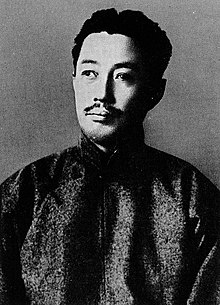
Back Ікі Кіта Byelorussian Kita Ikki German Ikki Kita Esperanto Ikki Kita Spanish کیتا ایکی Persian Ikki Kita French קיטה איקי HE Ikki Kita ID Kita Ikki Italian 北一輝 Japanese
This article has multiple issues. Please help improve it or discuss these issues on the talk page. (Learn how and when to remove these messages)
|
Kita Ikki | |
|---|---|
 Kita Ikki (北 一輝, Kita Ikki) | |
| Born | Kita Terujirō (北 輝次郎) 3 April 1883 |
| Died | 19 August 1937 (aged 54) |
| Cause of death | Execution by firing squad |
| Nationality | Japanese |
| Education | Waseda University (no degree) |
| Occupation | Author |
| Notable work | An Outline Plan for the Reorganization of Japan (日本改造法案大綱, Nihon Kaizō Hōan Taikō) 1919 |
| Children | 1 (adopted child, son of T'an Jen-feng, who was a Chinese Revolutionary) |
| Era | 20th-century philosophy |
| Region | Eastern philosophy |
| School | Japanese nationalism |
| Language | Japanese |
Main interests | Political philosophy |
| Part of a series on |
| Statism in Shōwa Japan |
|---|
 |
Ikki Kita (北 一輝, Kita Ikki, 3 April 1883 – 19 August 1937; real name: Kita Terujirō (北 輝次郎)) was a Japanese author, intellectual and political philosopher who was active in early Shōwa period Japan. Drawing from an eclectic range of influences, Kita was a self-described socialist who has also been described by some as the "ideological father of Japanese fascism",[1] though this has been highly contested, as his writings touched equally upon pan-Asianism, Nichiren Buddhism, fundamental human rights and egalitarianism and he was involved with Chinese revolutionary circles. While his publications were invariably censored and he ceased writing after 1923, Kita was an inspiration for elements on the far-right of Japanese politics into the 1930s, particularly his advocacy for territorial expansion and a military coup. The government saw Kita's ideas as disruptive and dangerous; in 1936 he was arrested for allegedly joining the failed coup attempt of 26 February 1936 and executed in 1937.
- ^ Maruyama, Masao (1956). Thoughts and Behaviour in Modern Japanese Politics (Ivan Morris ed.). London: Oxford University Press. p. 165.